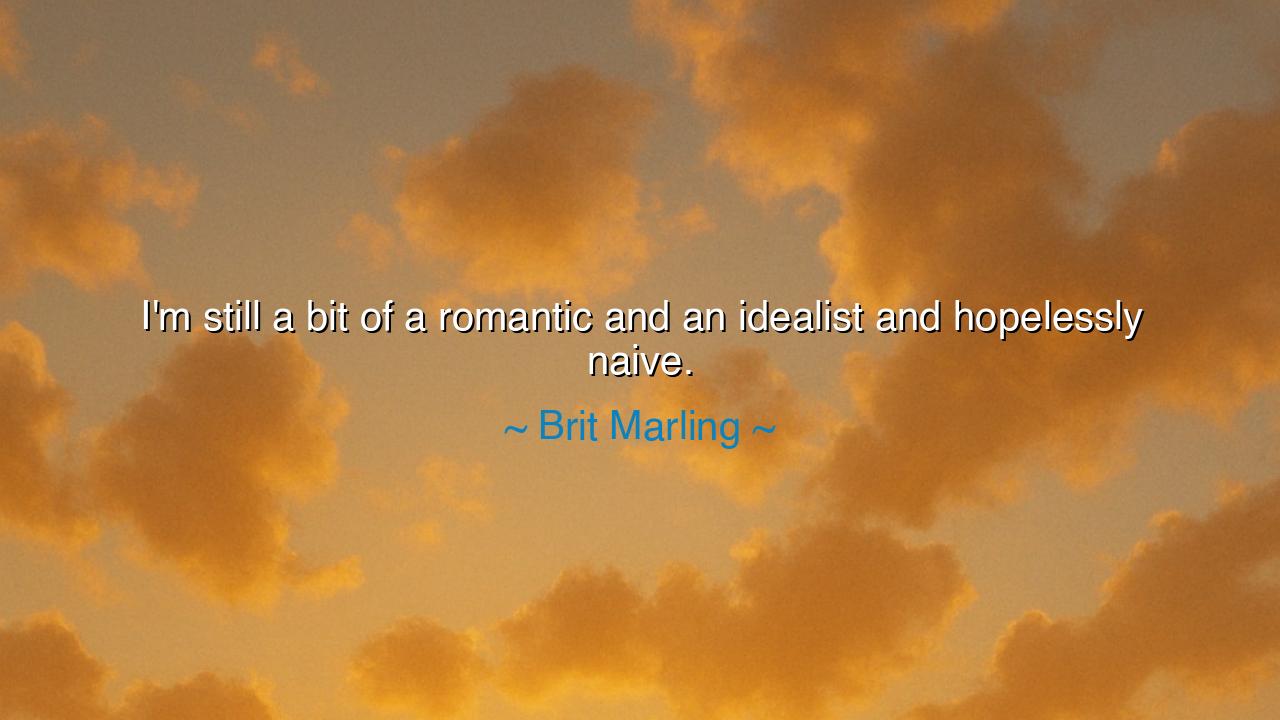
I'm still a bit of a romantic and an idealist and hopelessly






The words of Brit Marling fall upon the heart like the voice of one unashamed of her humanity: “I’m still a bit of a romantic and an idealist and hopelessly naive.” These words, though wrapped in humility, carry the fragrance of courage. For in a world hardened by cynicism, where many boast of realism and self-protection, to declare oneself still a romantic, still an idealist, still naive, is to proclaim the victory of light over shadows. It is to say, “Though the world has tried to teach me to close my heart, I will not.”
The ancients honored such spirits. They told of dreamers and poets, of visionaries who seemed foolish to their age but whose faith in beauty reshaped the world. To be a romantic is to believe that love and tenderness still matter more than power and wealth. To be an idealist is to believe that justice, truth, and goodness can triumph, even when the evidence whispers otherwise. To be naive, in this context, is not weakness, but the refusal to let despair strip the soul of wonder. Marling’s confession is not failure—it is victory, a refusal to surrender innocence.
Consider the story of Joan of Arc, a young maiden whose faith and visions stirred armies to rise. To the hardened lords of war, she seemed naive, hopelessly so, yet her idealism and devotion carried France through despair into hope. Her romantic belief that God spoke through her, her idealism that truth would prevail, and her naivete that men would listen with pure hearts—these very qualities that made her seem weak were what gave her strength. Though the world betrayed her, her name endures as a symbol of courage and purity of vision.
In the modern world, to remain a romantic and an idealist is itself an act of rebellion. The forces of disillusionment are strong: disappointments in love, betrayals in friendship, corruption in politics, falsehoods dressed as truth. Yet Marling’s words remind us that clinging to hope, even at the cost of seeming naive, is a form of spiritual heroism. It is easier to become bitter than to remain tender. It is easier to mock than to believe. But those who still believe are the ones who change the course of history.
There is also a deep beauty in the balance of her words. She admits she is “a bit” of these things—she knows the world is harsh, yet she chooses not to let that knowledge fully extinguish her flame. This is wisdom: not blind innocence, but the deliberate choice to protect a fragment of it, to let it live even in the storm. For the soul that keeps its innocence intact, even when tested, is like a lamp that shines not only for itself, but for all who are lost in darkness.
The lesson here is profound: do not scorn your own tenderness. If you find yourself still a romantic, cherish it. If you dream of a better world like an idealist, guard those dreams. If others call you naive, remember that all great souls are first misunderstood. The cynic may be praised for being “realistic,” but it is the dreamer who builds what the realist insists is impossible.
Therefore, let all who hear take action: Protect the child within you who still marvels at beauty, who still believes in love, who still trusts in goodness. Write with passion, dream without shame, love without calculation. Do not let the world make you cold. For in the end, it is not the hardened heart that changes history, but the heart that dares to remain soft. And in this, Brit Marling’s words are not weakness but a timeless summons: remain romantic, remain idealistic, remain naive—for in these lies the seed of all greatness.






AAdministratorAdministrator
Welcome, honored guests. Please leave a comment, we will respond soon